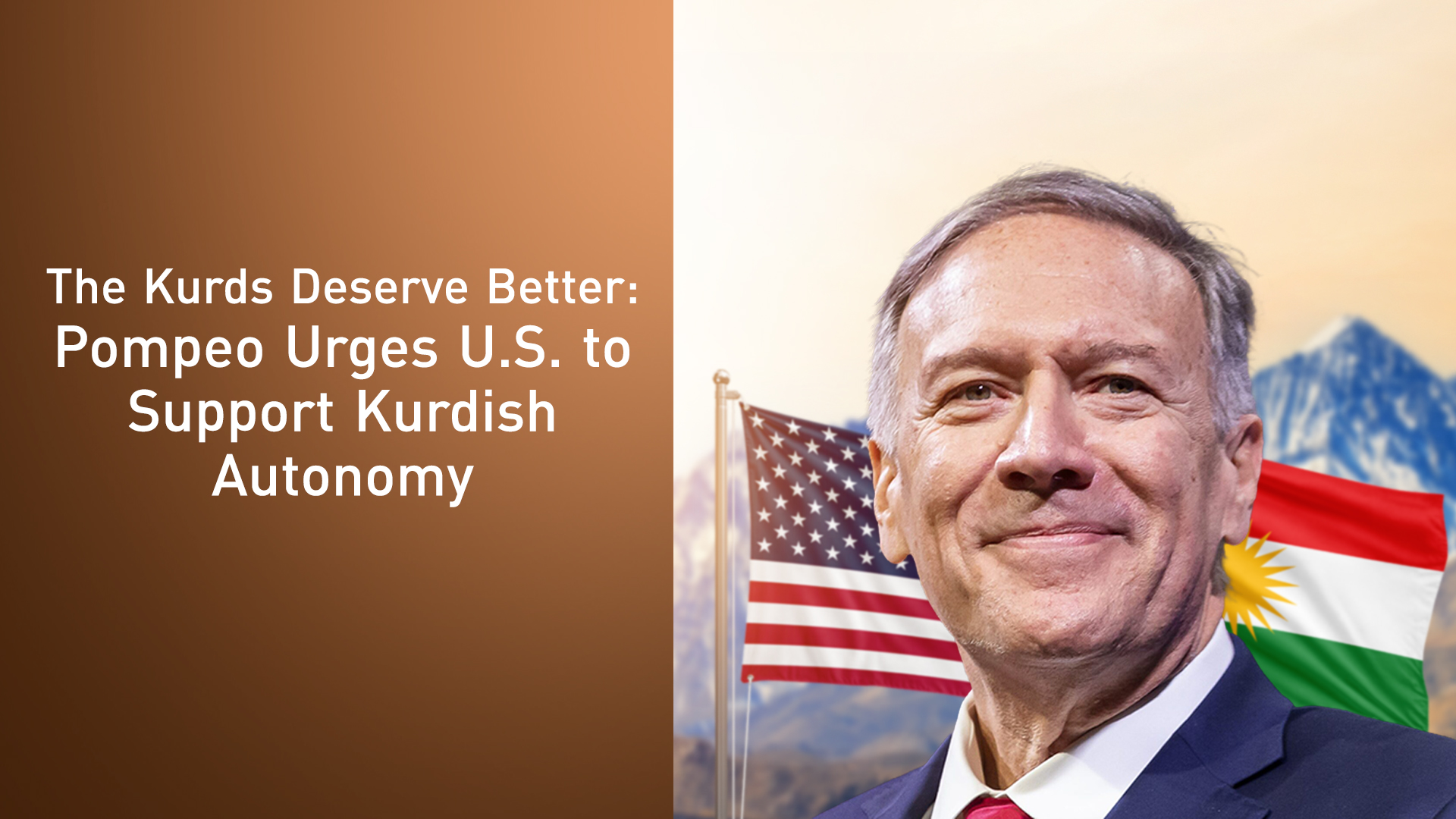The Kurds Deserve Better: Pompeo Urges U.S. to Support Kurdish Autonomy
Mike Pompeo: "America should respect the legitimacy of the 2017 Kurdish independence referendum, in which 93% of Iraqi Kurds chose independence."

ERBIL (Kurdistan24) — As Kurdistan Region Prime Minister Masrour Barzani visits Washington this week, former U.S. Secretary of State Mike Pompeo has made a compelling case for renewed American support for Kurdish autonomy, arguing that the Kurds are among the United States' most reliable and principled allies in the Middle East.
In an article published by the New York Post on May 20, 2025, Pompeo—who also served as Director of the Central Intelligence Agency—outlined a strategic and moral argument for advancing Kurdish self-determination. Titled "The Kurds deserve better — how the US can support an ally’s bid for freedom", the op-ed calls on Washington to revise its longstanding policy of hesitance toward Kurdish independence in favor of a proactive and principled stance.
Loyal Allies in a Volatile Region
Pompeo begins by affirming the Kurdish people’s steadfast loyalty and sacrifice, noting that Kurdish forces have fought on the front lines against jihadist threats like ISIS and al-Qaeda, often at great cost and with little hesitation.
"Unlike many other partners in the region," Pompeo wrote, "the Kurds never engaged in anti-American terrorism, never cost American lives, and never wavered in their friendship."
Their contributions, he argues, have spared American blood and treasure and yielded extraordinary returns on relatively modest U.S. investments, especially when compared to the trillions spent elsewhere in the region.
Pompeo underscored that "Kurdish fighters have consistently battled America’s worst enemies — jihadist groups like ISIS, al Qaeda, and others— sparing American blood and treasure."
"They’ve proven themselves to be one of America’s most reliable partners in the Middle East — but the Kurdish people still have no real homeland of their own," he wrote.
A Strategic Asset
Pompeo also points to the Kurdistan Region’s significant natural resources, including an estimated 45 billion barrels of oil—about a third of Iraq’s reserves—and large untapped natural gas and mineral deposits. Despite heavy-handed restrictions from Baghdad, the Kurdistan Regional Government (KRG) has managed to establish a functioning, investment-attracting economy.
“If granted economic freedom,” Pompeo writes, “Kurdistan would rapidly develop into a self-sufficient partner that strengthens America’s strategic position without draining our resources.”
Moreover, he describes the Kurdish-governed territories as “islands of relative tolerance and pluralism” in a region rife with authoritarianism, extremism, and anti-American sentiment. The Kurdish people, he adds, have consistently rejected antisemitic and anti-American ideologies, embracing instead democratic values and a desire for representative government.
"Kurdish ambitions for greater autonomy are not only righteous, they align with America’s own critical interests," he emphasized. "As secretary of state and CIA director in President Trump’s first term, I witnessed their unwavering commitment to our shared objectives firsthand."
Confronting Regional Obstacles
Pompeo criticizes U.S. foreign policy for allowing regional actors—particularly Iran—to undermine Kurdish autonomy with impunity. He cites incidents like Iran’s missile attacks on Kurdish territories and Baghdad’s economic pressure tactics, such as blocking oil exports and withholding budget payments to Erbil.
“These are not isolated incidents,” he warned. “They are part of a broader strategy, often encouraged by Tehran, to strangle Kurdish autonomy and force submission.”
Pompeo urges Washington to enforce clear red lines to deter such aggression and to use its influence with Baghdad to lift economic blockades. Doing so, he argues, would not only benefit the Kurds but also contribute to global energy security.
"We must also keep Kurdish regions from being economically strangled as punishment for their autonomy," he wrote.
Washington should leverage its substantial influence with the Iraqi government to lift export blocks. This will both allow the Kurds to thrive and increase the global oil supply, strengthening energy security.
Honoring a Democratic Mandate
Pompeo also called on the U.S. to recognize the legitimacy of the 2017 Kurdish independence referendum, in which 93% of voters favored secession from Iraq. Rather than respect the outcome, the Iraqi government, with Iranian backing, launched military operations and imposed a blockade to punish the Kurdish population.
“At that time,” Pompeo wrote, “the United States chose to place Iraq’s artificial stability over Kurdish aspirations — a mistake we should now rectify.”
Acknowledging the referendum, he suggests, would signal U.S. respect for the democratic will of a people who have earned the right to determine their own future.
"America should respect the legitimacy of the 2017 Kurdish independence referendum, in which 93% of Iraqi Kurds chose independence," Pompeo wrote.
Advising the current U.S. Administration under President Trump, he stressed that "at this critical juncture in America’s engagement in the Middle East, we should incorporate the Kurds into our regional strategy."
A Path to Peaceful Sovereignty
Pompeo concludes with a call for diplomacy aimed at establishing a long-term framework for Kurdish autonomy and potential independence. He emphasizes that such a move would advance U.S. strategic interests and reinforce America’s image as a nation that stands by its friends.
He also advocates for diplomatic engagement with Turkey, encouraging Ankara to view a more independent Kurdistan not as a threat, but as a path to regional stability and an end to chronic insurgency.
"Prime Minister Barzani should receive a strong welcome in the United States," Pompeo wrote, "as we explore ways to jointly advance peace and prosperity."
Pompeo’s op-ed arrives at a time of renewed diplomatic activity between the U.S. and the Kurdistan Region, as Prime Minister Barzani seeks to solidify political and economic partnerships. While successive U.S. administrations have historically favored Iraq’s territorial integrity over Kurdish ambitions, voices like Pompeo’s suggest a growing awareness in Washington of the strategic and moral case for a shift in policy.